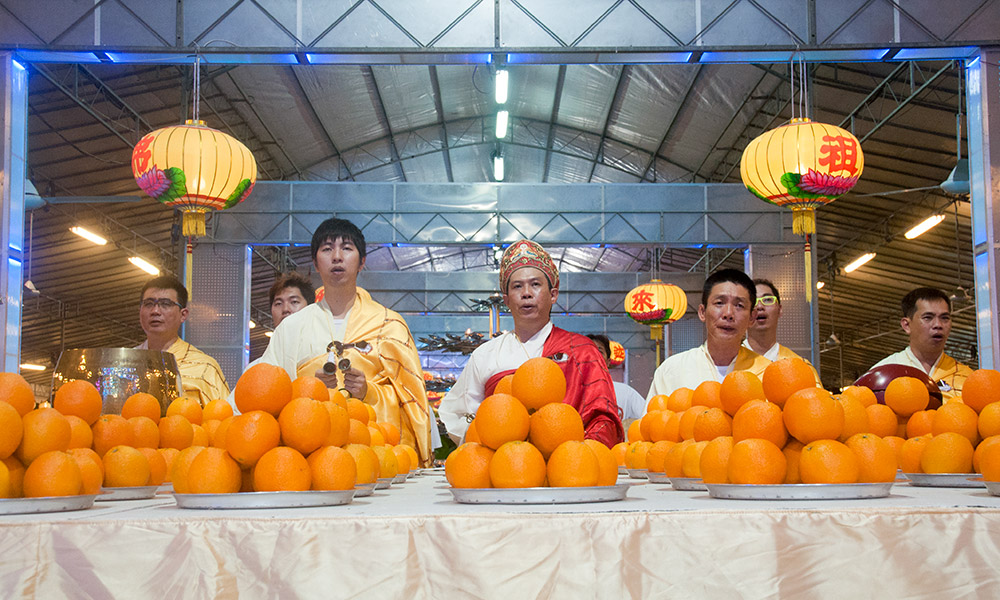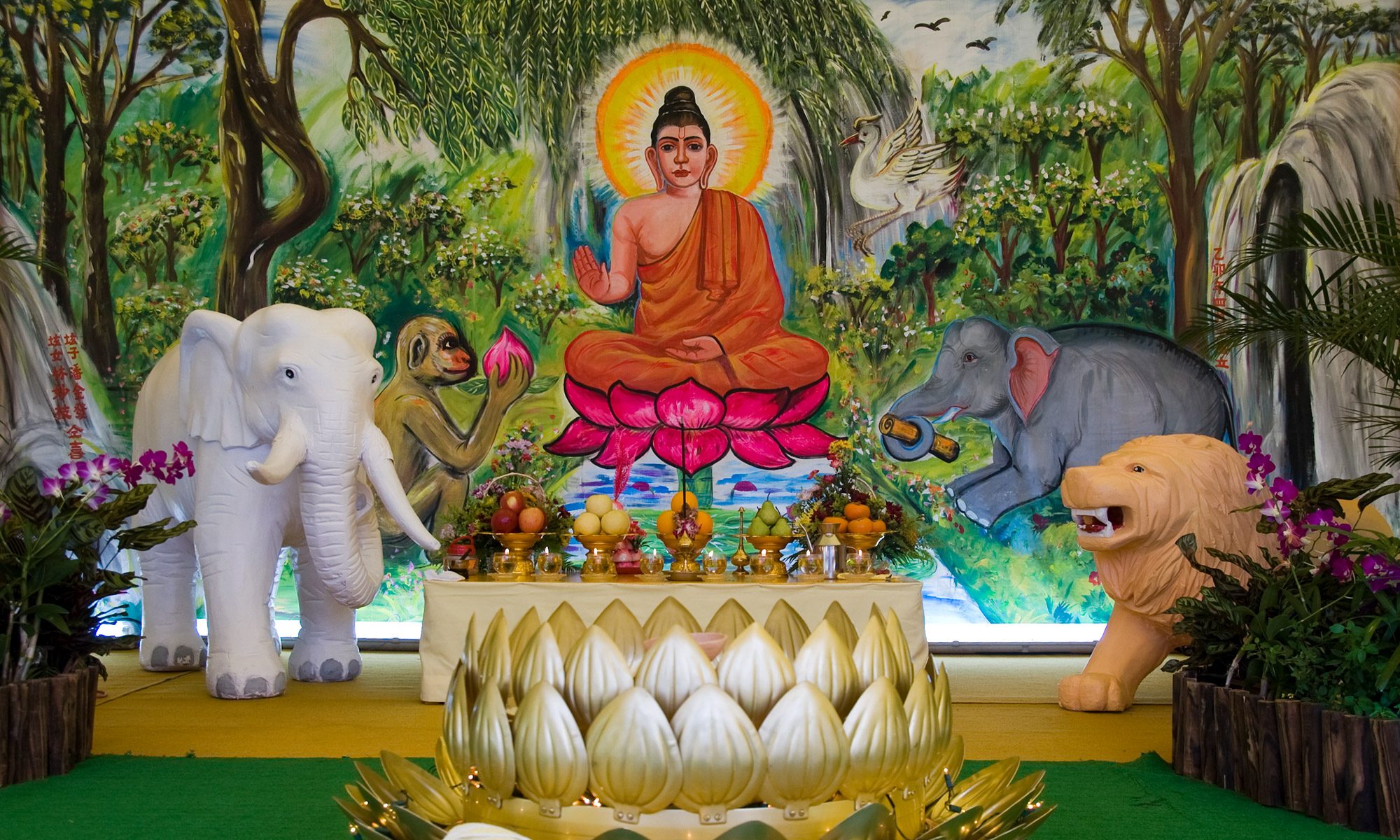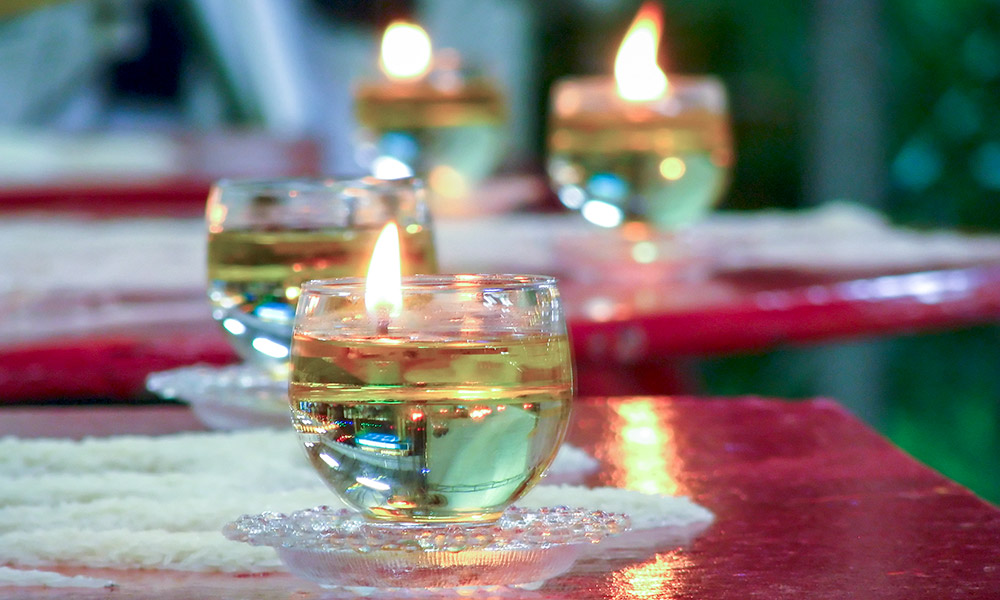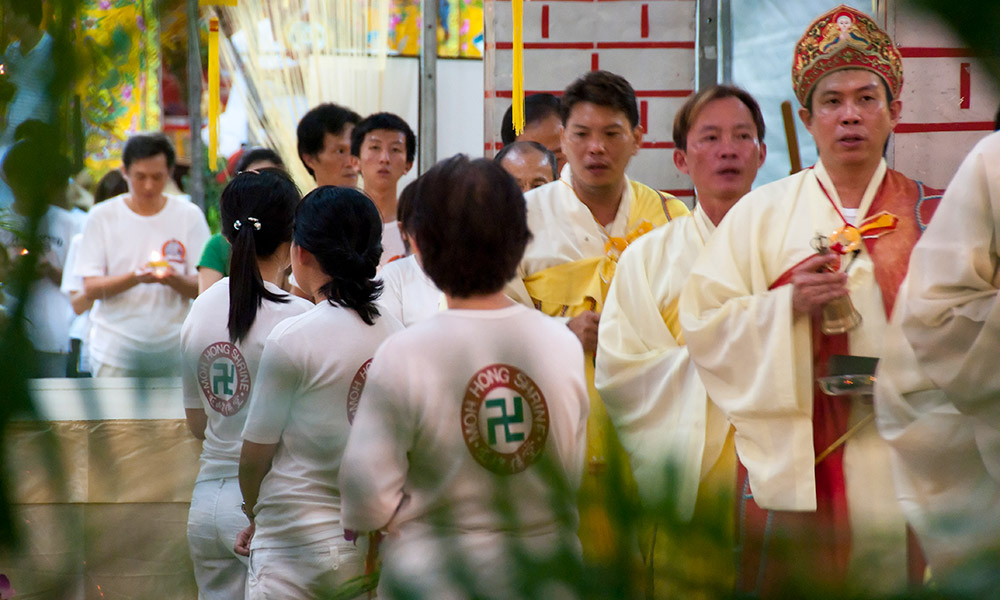Our Vesak Oil Lamp Procession
光灯
Easing one’s karmic energy
The focus of the Oil Lamp (光灯) Chant is to invite the Ksitigarbha Bodhisattva and the ten guardians of hell to bear witness to the ritual that is used to alleviate the negative karmic energy of the participants (deceased or living). The eleven lamps, one for each witness, are placed on the table positioned in front of the prayer stage during the chant.

The table is adorned with a mandala made of uncooked rice grains – a Chinese simplified variation of the Tibetan sandpainting. Mandalas are objects employed for focusing the attention of aspirants and adepts as an aid to meditation. Mandalas are seen as sacred places that remind the viewer of the inherent presence of sacredness around us and the potential in his or her self in achieving the same enlightenment.
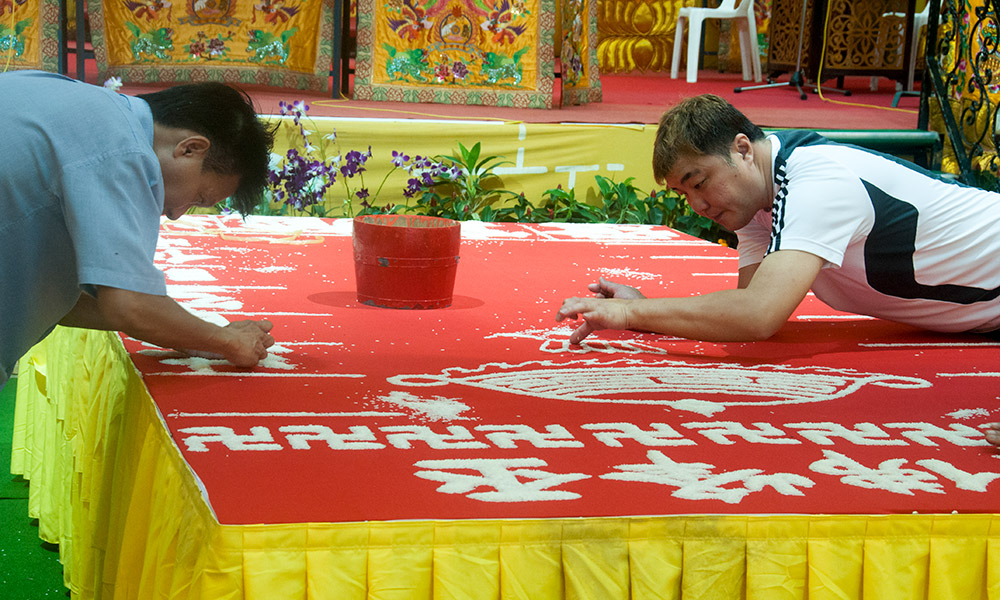
The rice painting is brushed together upon completion of the chant, symbolic of the impermanence of life – a central teaching of Buddhism. The collected rice is redistributed back to the individuals, who have made offerings through the Shrine, as a way of spreading the blessings of the mandala.
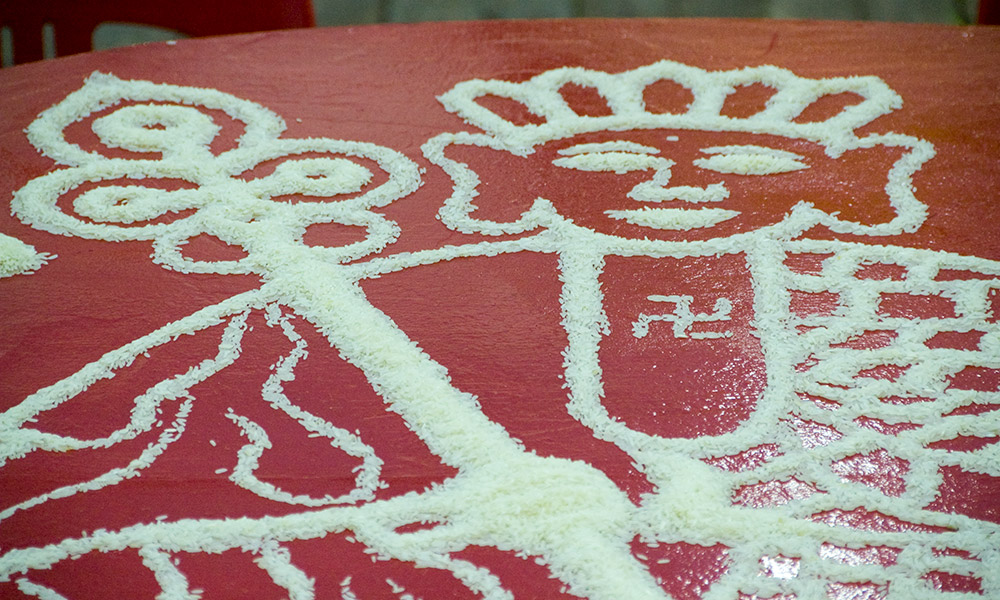
This Oil Lamp Procession Chant (Chant) is led by a group of seven chanters. Six of whom are dressed in yellow robes that has brick line patterns. The main lead wears a similar designed red robe with a matching headdress and carries in his left hand, a golden staff – symbolic of Ksitigarbha Bodhisattva.
The Chant includes a procession by participants each holding a lamp walking around the entire length of the temple site, circumventing the mandala three times.
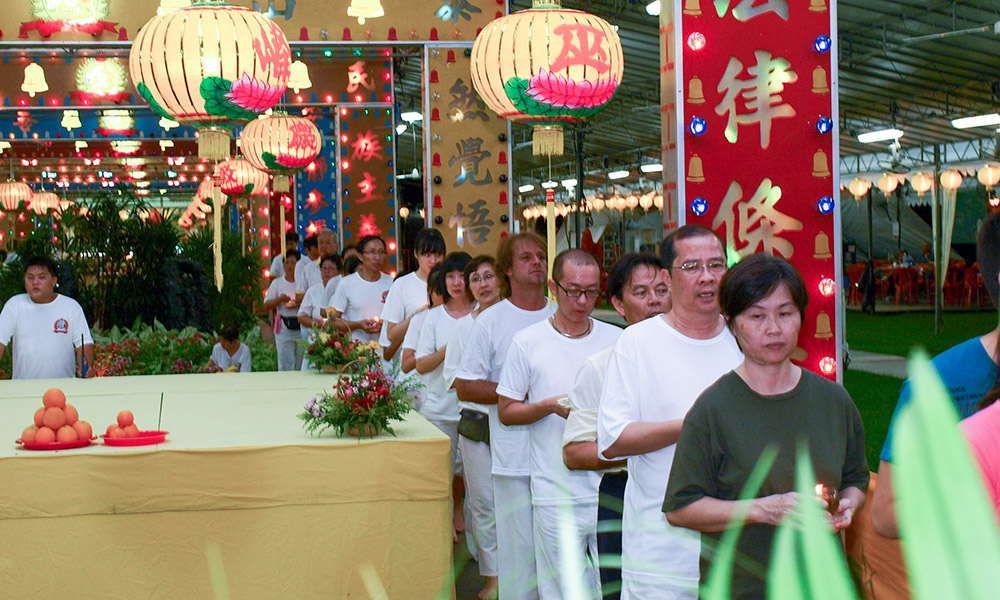
Chant – Singing Praises
The Chant comprises three individual songs. The first “Teacher of Three Worlds”, (三教主)a composition by the Shrine, is a tribute to the Buddha and His life. The second (僧三宝), literally translated as “Three Treasures”, praises the Buddha, the Dharma and the Shangha. The final song in this Chant is the “illuminating lamp” (光灯?? ) which contains praises and a mantra. This song is used to awaken the mind and prepare the participants for receiving the benefit of the procession.
According to our Master, 60% of the benefit of this procession is received through the participation alone but the remaining is entirely dependent on an individual – the degree is subject to his/her dedication and ability to focus not just in terms of the mind but also the heart.
While repeat chanting of the verse “Namo Di Chang Wan Po Sak” is just but one method to help participants focus their mind during the procession. However it is equally crucial for you to calm your mind throughout the entire Chant, right from the first song. While participants do not partake in the chanting of the songs directly, they should listen and begin to appreciate the chants and the essence of the teachings when these songs are sung.
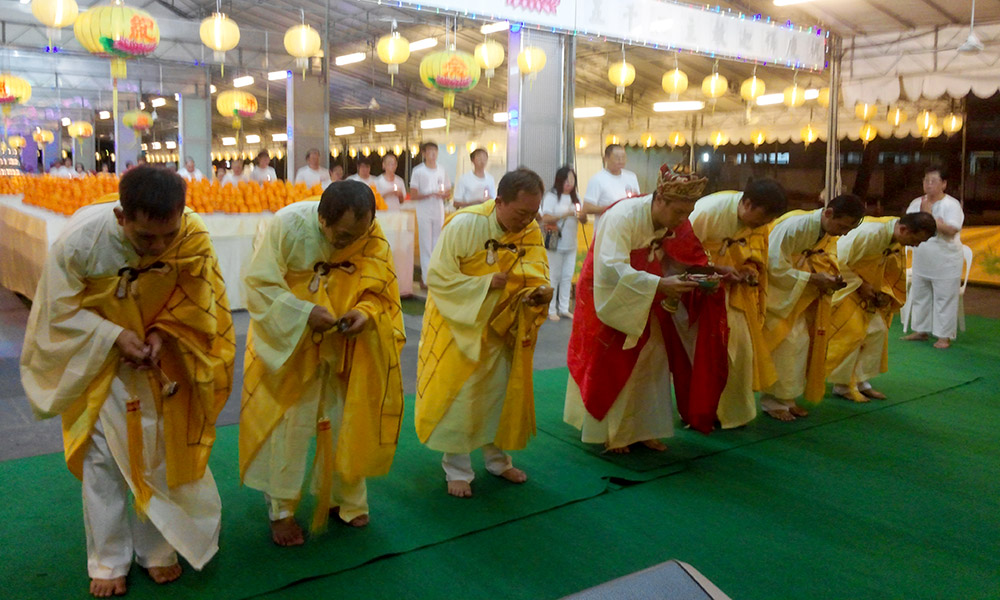
“Illuminating Lamp” – final of three songs in the Chant
This song, the final of a collection of three in the Chant, consists of three segments; a praise, a mantra, and another praise. The first praise is on the virtues of Ksitigarbha Bodhisattva while the second praise is on the ten guardians of hell and includes a portion that serves to awaken the participants to the impermanence of life. This is done by examining the five phases of the night as seen through a departing soul.
Segment One – Praises to Ksitigarbha Bodhisattva
This segment of the song serves to awaken the mind to the teachings of the Buddha. It opens with a bleak description of hell – a season-less existence with eternal darkness (neither day nor night) where the depth is beyond comprehension.
The next part praises Ksitigarbha Bodhisattva(地蒇 王菩萨) whose name in Chinese literally translates to “Earth Treasure”. Ksitigarbha Bodhisattva vowed to gain enlightenment only after he has released all beings from the hungry ghost realm (地狱不空,誓不成佛;众生度尽,方证菩提). He is described in the chant as the one who holds and a pearl in one hand and the golden staff in the other. He opens the gate of hell with his staff, representing his desire to release all from suffering.
The praises serve to remind us of the virtues he represents i.e. patience, earnestness, and tranquility. “安忍不动,犹如大地。”故名为地。 “静虑深密,犹如秘藏。”故名为藏。 “王”是自在之意。 所以说“地藏王”的意思是:非常忍耐的,严肃沉静的,自在的。The lamp within HIS heart illuminates clears all darkness for all mankind and sentiment beings.
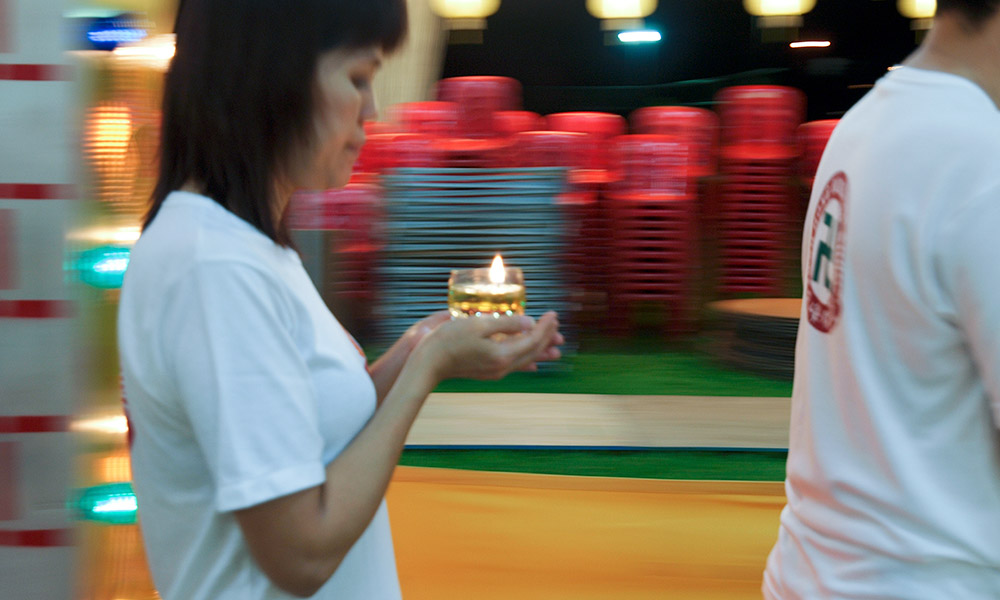
Segment Two – Mantra, a mnemonic device
This second segment contains the mantra – which embodies the essence of the Buddha’s teaching. Mantra- often simply described as vowels or sounds made by the Buddha upon the completion of his teachings (dharma). The practice of sutra chanting is commonly associated with esoteric Buddhism. Mantra is generally understood as a mnemonic device which encapsulates the meaning of a section or chapter of a sutra. Thus a mantra can be considered to be a linguistic device for deepening ones thought, or in the Buddhist context for developing the enlightened mind. Mantras have also been used as magic spells for very mundane purposes such as attaining wealth and long life, and eliminating enemies.
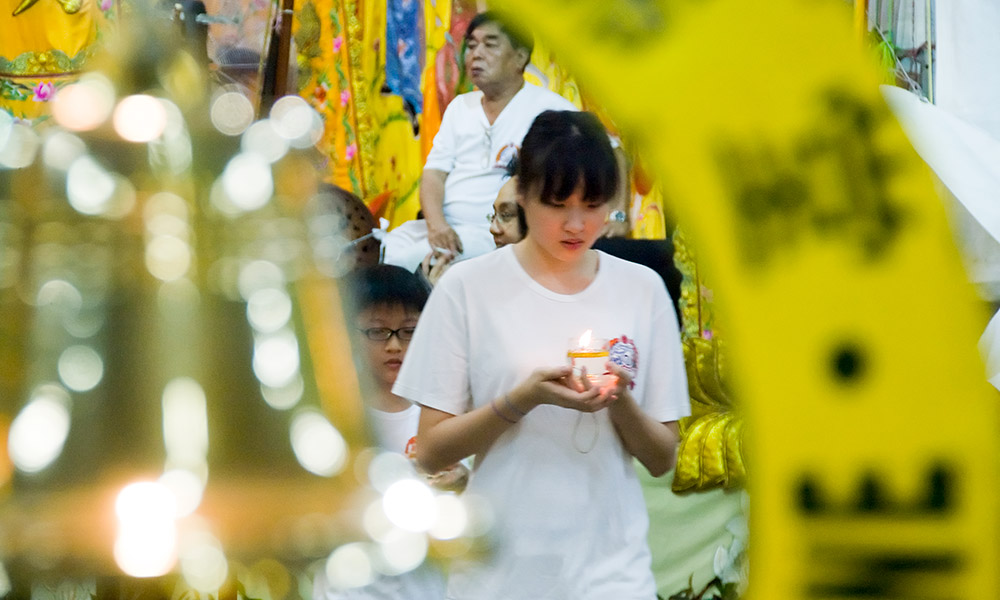
Segment Three – 5 periods of Night and Praises to the Ten Guardians of Hell
This segment serves to remind the participants of the impermanence of life and the description these hours of the night is seen through that of a departing soul.
First call of night (一 更)
Life is impermanent, death comes to all. So waste not but appreciate the time we have and begin to practice the dharma
Second call of night(二 更)
The night darkens, the streets deserted and the altar is quiet. Whatever wealth you have accumulated in your life, it cannot be brought along with you. It is to be left behind.
Third call of night (三 更)
You can no longer meet, feel or touch your friends. You only exist through their dreams. Your life is now nothing but just a dream.
Fourth call of night (四 更)
The time in a day and hours of the night passes like wool on a spinning loom. Heed the Buddha’s advice and begin practicing His teachings.
Fifth call of Night (五 更)
Dawn is breaking. The flickering altar candles weep their final tear of wax and the burning incenses exhale their last scented breath. The surrounding is quiet. You are lost, where should you go and who could you lean on? Heed the Buddha’s advice, practice His teachings. When your hour comes, lost are you no more.
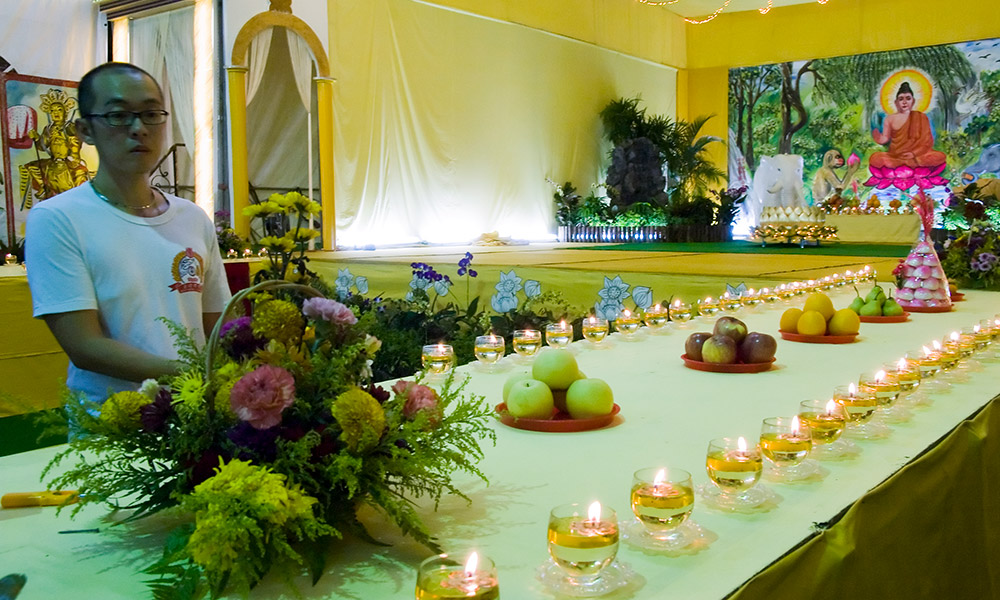
The second part of this 3rd segment includes a tribute to the 10 guardians of hell namely 秦广王, 楚江王, 宋帝王, 伍官王, 阎罗天子, 卞成王, 泰山王, 平政王, 都市王, 转轮王,
and the values they posses.
The Chant closes with a summary of wishes and reminders –
The string of 108 lamps illuminates the path in a continuous stream of light.
- May this lamp lighten your load and brighten your spirit
- May the negative karma, ill fortunes, misconceptions be lifted by the brightness of the lamp
- May the good energy from the prayers of this night be to all presence here tonight
- May Ksitigarbha Bodhisattva help all beings in the six realms of existence; help us cross over the samsara stream
Everything is but a dream, nothing is real. Be like the lotus, not tainted by the mud upon which it emerges. Remain focused and calm with a peaceful mind, and not be troubled by the mundane affairs of this world.
